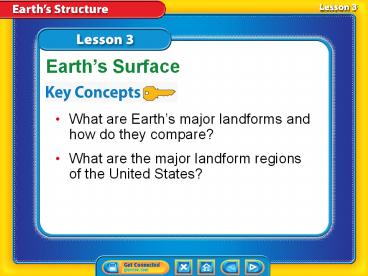Lesson 3 Reading Guide - KC - PowerPoint PPT Presentation
Title:
Lesson 3 Reading Guide - KC
Description:
Earth s Surface What are Earth s major landforms and how do they compare? What are the major landform regions of the United States? Lesson 3 Reading Guide - KC – PowerPoint PPT presentation
Number of Views:102
Avg rating:3.0/5.0
Title: Lesson 3 Reading Guide - KC
1
Lesson 3 Reading Guide - KC
Earths Surface
- What are Earths major landforms and how do they
compare? - What are the major landform regions of the United
States?
2
Lesson 3 Reading Guide - Vocab
Earths Surface
- landform
- plain
- plateau
- mountain
3
Lesson 3-1
Oceans and Continents
- Oceans cover more than 70 percent of Earths
surface. - Many of the features that appear on dry land
also appear on the ocean floor.
4
Lesson 3-2
Landforms
- Landforms are topographic features formed by
processes that shape Earths surface. - Scientists use the term topography to describe
the shape of a geographic area. - Many factors such as erosion or uplift of Earths
surface can create and affect landforms.
5
Lesson 3-2
- A landform is usually identified by its surface
form and location.
6
Lesson 3-2
Landforms (cont.)
- Scientists use the term elevation to describe the
height above sea level of a particular feature. - Relief is a term that scientists use to describe
differences in elevation.
7
Lesson 3-2
- Areas with high relief have a relatively large
difference between the lowest elevation and the
highest elevation.
8
Lesson 3-2
Landforms (cont.)
- Plains are landforms with low relief and low
elevation. - Plains can form when sediments are deposited by
water or wind.
9
Lesson 3-2
Landforms (cont.)
plains from Latin planus, means flat, level
10
Lesson 3-2
Landforms (cont.)
- Plateaus are areas with low relief and high
elevation. - Plateaus are much higher than the surrounding
land and often have steep, rugged sides. - Plateaus can form when forces within Earth uplift
rock layers or cause collisions between sections
of Earths crust.
11
Lesson 3-2
Landforms (cont.)
- Plateaus can also be formed by volcanic activity.
- Mountains are landforms with high relief and high
elevation. - Mountains can form from a buildup of lava on the
ocean floor, or when forces inside Earth fold,
push, or uplift huge blocks of rocks.
12
Lesson 3-2
United Stated Landforms
13
Lesson 3-2
Medioimages/Photodisc/Getty Images
14
Lesson 3-2
15
Lesson 3-2
Landforms (cont.)
Describe at least three major landform regions in
the United States.
16
Lesson 3 - VS
- Landforms are topographic features formed by
processes that shape Earths surface. - Major landforms include flat plains, high
plateaus,and rugged mountains.
17
Lesson 3 - VS
- Major landform regions in the United States
include the Appalachian Mountains, the Great
Plains, the Colorado Plateau, and the Rocky
Mountains.
18
Lesson 3 LR1
Which term refers to landforms with low relief
and low elevation?
A. plains B. plateaus C. mountains D. oceans
19
Lesson 3 LR2
Which term is used to describe the height above
sea level of a landforms particular feature?
A. relief B. mountain C. elevation D. topography
20
Lesson 3 LR3
Which term do scientists use to describe
differences in elevation?
A. height B. plateau C. relief D. elevation
21
Lesson 3 - Now
Do you agree or disagree?
5. All ocean floors are flat. 6. Most of Earths
surface is covered by water.




























![Honors Level Course Implementation Guide [English Language Arts] PowerPoint PPT Presentation](https://s3.amazonaws.com/images.powershow.com/7928665.th0.jpg?_=20160626066)


